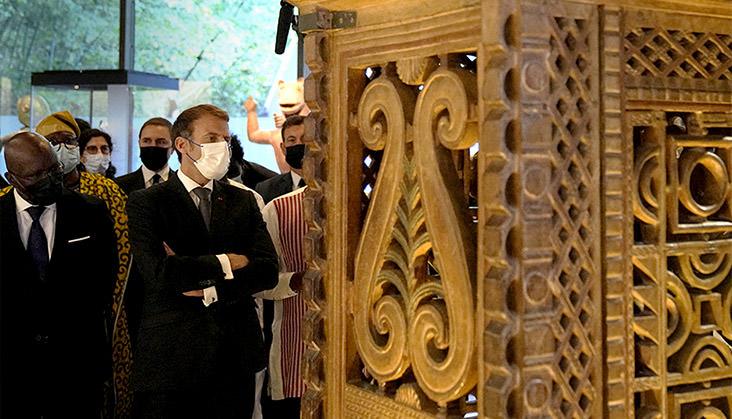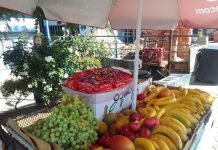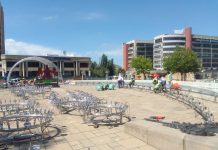Africa-Press – Lesotho. Such a succession of dates is rare in politics, where promises often evaporate as soon as they are made. On 28 November 2017, in Ouagadougou (Burkina Faso), French President Emmanuel Macron said: “I cannot accept that a large part of the cultural heritage of several African countries is in France.
There are historical explanations for this, but there is no valid, lasting and unconditional justification for it. African heritage cannot only be [held] in private collections and European museums.
African heritage should be promoted in Paris, but also in Dakar, Lagos and Cotonou, and this will be one of my priorities. I want the conditions to be in place within five years for the temporary or permanent restitution of African heritage to Africa.
A few months later, in March 2018, the Élysée announced the creation of a “reflection and consultation” mission for the restitution of African cultural heritage and the submission of an official report.
It was not a coincidence: the declaration was made during the Paris visit of Patrice Talon, the Beninese president who had been asking France – since 2016 – to return parts of its heritage that were looted during the colonial period.
The drafting of the report was entrusted to art historian Bénédicte Savoy and Senegalese intellectual Felwine Sarr.
Less than a year after Macron’s Ouagadougou speech and a few days before the planned submission date – 23 November 2018 – the text’s 232 pages were leaked to the press.
The authors, who based their report almost exclusively on statistics from public collections in sub-Saharan Africa, recommended the rapid return of objects taken by force or “presumed to have been acquired under unfair conditions”.
This concerned “works” seized “during military confrontations”, those acquired “by military or administrative personnel active on the continent during the colonial period (1885-1960) or by their descendants”, those taken “during scientific missions prior to 1960” or lent by African institutions to certain museums for exhibitions or restoration campaigns, but were never returned.
The issue of the restitution of Benin’s cultural heritage would soon come to the fore: the 26 works looted by General Dodds in Benin in 1892 were exhibited for the final time at the Quai-Branly Jacques-Chirac Museum in October 2021 before heading back to their homeland.
To accomplish this, France’s inalienable and imprescriptible laws were not modified in substance, but an exception was made for Benin and Senegal. On 24 December 2020, an amendment relating to the restitution of cultural property from these two countries took effect, making it possible to return the 26 pieces pillaged from Abomey by plane.
They are now on display until 22 May at the Marina Palace in the port city of Cotonou. For the Quai Branly Jacques-Chirac Museum alone, the Savoy-Sarr report cited 46,000 works acquired between 1885-1960 that could (potentially) be repatriated.
Therefore, 26 is not much, but it’s a first step, and the Musée du Quai-Branly knows what it’s doing. Its new president, Emmanuel Kasarhérou, has highlighted the vast research project focused on its collection’s origins, particularly African ones.
“One of the contributions of the report is to push museums to question the collections from the colonial periods,” Kasarhérou says.
“This is a real question, which has encouraged research on provenance and will allow us to identify sets that were taken by violence or by force. These two criteria will allow us to isolate works that can then be discussed if the [concerned] countries wish”.
Kasarhérou’s final statement also seems to sum up Macron’s point of view: If African countries come forward on this issue, the French government is ready to talk with them.
And he is not the only one. One of the French president’s greatest achievements was the reopening of a debate that had long been overshadowed, even outside of France.
However, soon after the Sarr-Savoy report was submitted, the opponents of restitution became less and less audible and their arguments – particularly concerning the quality of African museums – less and less convincing. In Belgium, as in Germany, cultural institutions had to adopt a position and act on it.
In Brussels, where the term “reconstitution” is preferred over “restitution”, State Secretary for Recovery and Strategic Investments Thomas Dermine has been working with the director of the AfricaMuseum in Tervuren, Guido Gryseels, and Congolese institutions.
A joint commission, set up by bilateral agreement and equally composed of Belgian and Congolese experts, is responsible for determining whether the works were acquired legitimately or not.
In case of the latter, legal ownership will be transferred immediately. On the Berlin side, the return process is set to begin by summer 2022. “Substantial returns” are expected to follow, although no practical details have yet been provided.
According to certain sources, some of the Beninese bronzes are expected to be returned to Nigeria before the Edo Museum of West African Art (EMOWAA), planned for 2024, is completed.
For restitutions to take place, requests for return must be sent in the form of a diplomatic “note verbale” – a document used for communication between embassies or ministries, including information about the requisitioned objects and the reasons for the request.
In order to allow for the transfer of ownership by this summer, the consent of the federal government, federal states (Länder) and municipalities is required.
The federal government has already committed itself in terms of Berlin museums, as have the city of Cologne and the state governments of Hamburg and Baden-Württemberg. The latter is among those that want to organise the first returns as early as 2022.
In the event of a delay at the federal level, Teresia Bauer, the minister for science, research and art of this state, says: “We reserve the right to take action ourselves.
” After five years of Macron’s presidency, it would be a show of bad faith to say that he has not made any progress on the issue. Even so, one can also detect the French head of state’s skill for toying with symbols.
“I am not a political stuntman, I’m working for the bottom line, not to show off,” Belgium’s Thomas Dermine said during his November 2021 trip to Congo.
“It was easy to ask Guido Gryseels, the director of Tervuren, for two problematic, symbolic masks and a statue – we know which ones – and to take a couple of photos, but aren’t we reproducing colonial patterns by clearing our conscience through acts of symbolism?
With the restitution question propelled to the front of the stage, Macron was able to push into the background – and sometimes even obscure – France’s troubled relationship with certain authoritarian regimes.
“I have not come here to tell you what France’s Africa policy is, as some people claim,” he said in Ouagadougou.
“Because France no longer has an Africa policy! There is a policy that we can [implement], there are friends, there are people with whom we agree, others not.
”
Whatever the case, French soft power remains time-tested: in Benin, the French Development Agency (AFD) will partly finance (for CFA francs 23bn/$38m) the establishment of the Musée de l’épopée des Amazones et du royaume de Danhomé on the palatial Abomey site, and French museum expertise is involved at several levels.
As for the Sarr-Savoy report, while it has helped move the debate forward, it suffers from a particularly troublesome bias: it only targets public institutions – in particular, universal spaces, such as museums.
Still, many works illegally taken out of Africa remain in the hands of private collectors – and no one has really looked into the archives of auction houses, where the provenance of each work is supposed to be recorded with the greatest precision.
Should the state be the only one to give back? In 2016, with the help of his lawyers, Congolese businessman Sindika Dokolo sued the private sector: gallery owners, collectors, and companies. Since his death in October 2020, the collectors have been sleeping peacefully.
For More News And Analysis About Lesotho Follow Africa-Press






